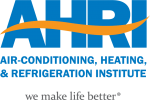Refrigeration Industry Leaders Organize Global Refrigerant Management Initiative
Initiative Marks Milestone Toward Reducing HFC Greenhouse Gas Emissions
Three of the world's leading refrigeration associations - The Alliance for Responsible Atmospheric Policy, the Air-Conditioning, Heating and Refrigeration Institute (AHRI), and the Brazilian Association for HVAC-R (ABRAVA), recently announced the formation of the Global Refrigerant Management Initiative at the United Nations Secretary-General's Climate Summit.
The leakage of refrigerant during the servicing of equipment is the largest source of hydrofluorocarbon (HFC) emissions around the globe. This Initiative will work to identify opportunities to educate the industry's global supply chain on ways to improve the management of refrigerants and to reduce leaks and service emissions, particularly where current leak rates are the greatest. In addition, the initiative will promote the recycling, recovery, reclaiming and end of life destruction of refrigerants and develop policies to promote proper refrigerant management.
"Leaks from equipment installation and servicing are the largest source of HFC emissions around the globe," said Kevin Fay, Alliance Executive Director. "We have established this initiative because it is incumbent on all sectors of our industry to work with our governments to educate the individuals who install, service, and replace HVAC-R equipment on how to handle these refrigerants responsibly and to create a culture of responsible care."
In addition to these leading organizations, this private-sector organized effort will include participation from refrigerant organizations from Australia, Canada, China, Colombia, the European Union, Japan, Mexico and South Korea - a true global coalition that represents 90 percent of refrigeration and air conditioning equipment sold around the globe. The initiative will also work with CCAC (Climate and Clean Air Coalition) partners to develop and implement broad-based public and private sector collaborative programs to reduce HFC emissions by building awareness, training and implementation guidance for proper management, servicing and refrigerant end-of-life practices.
"Environmental stewardship is a hallmark of our industry," said AHRI President Stephen Yurek. "This initiative furthers our commitment to providing for the health, safety, and comfort of people around the world in the most responsible way possible," he said.
The growth of HFC emissions has been identified as a significant concern. HFCs are compounds introduced to rapidly replace ozone depleting substances being phased out by the Montreal Protocol. Currently, HFCs only comprise about 1 percent of global greenhouse gas emissions. However, unabated, HFCs are expected to increase to greater than 10 percent of greenhouse gas emissions by 2050. ABRAVA International president, Samoel Vieira de Souza said that "There is no question that emissions are a concern of the entire supply chain."
The Alliance and AHRI participated in an HFC Industry Leadership Roundtable at the White House. At that meeting, Alliance member companies and others announced their voluntary commitments to introduce new low- global warming potential (GWP) compounds and technologies to replace the high-GWP compounds and technologies currently in use, and to continue to improve energy efficiency as well. The industry will invest $5 billion over the next decade to research, develop, and commercialize low-GWP technologies new refrigerants and the equipment in which they will be used. The Alliance pledged to take actions and support policies to reduce global HFC emissions by 80 percent by 2050. The industry leaders advocated for the North American-proposed amendment to the Montreal Protocol as the best means of achieving a global phase-down of HFCs while increasing research and development of the next generation of refrigerants.



